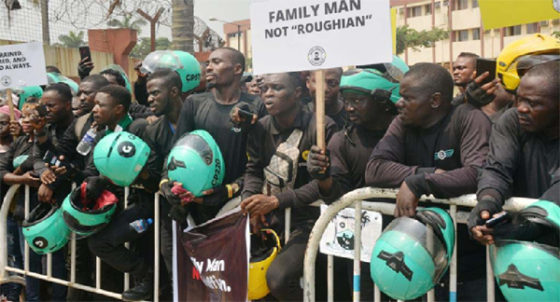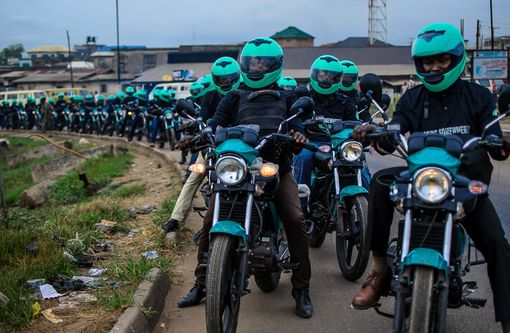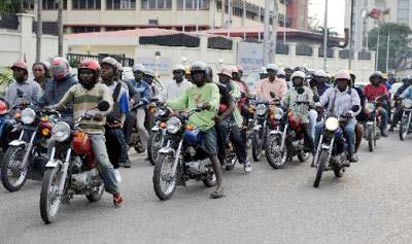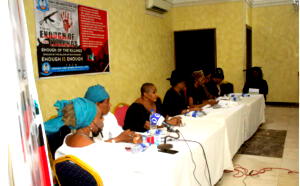…Say, we’re waiting for the taskforce … As ban takes effect from today … Residents commend ban, express fears … 600 deaths recorded in 10...
 …Say, we’re waiting for the taskforce
…Say, we’re waiting for the taskforce
… As ban takes effect from today
… Residents commend ban, express fears
… 600 deaths recorded in 10,000 Okada accidents in Lagos
…If this ban came early, my husband would’ve been alive —Bereaved lady
…Benefits of the ban
By Ishola Balogun, Evelyn Usman, Olasunkanmi Akoni and Samuel Ameh
The stage is set for a major confrontation between the Lagos State Government and commercial motorcyclists and tricycle operators otherwise known as Okada and Keke riders today.
Last week, the state government announced the ban on their activities in six Local Government Areas and nine Local Council Development Areas in the state, with its enforcement to begin today, February 1, 2020.
Other states in the federation have equally banned them but they found their way to Lagos.
The decision to ban them according to the Commissioner for Information and Strategy, Gbenga Omotoso, was reached after consultation with stakeholders and the State Security Council, in compliance with the extant Transport Sector Reform Law 2018. The consultation with stakeholders he said, was necessitated by the debate on what had been widely referred to as the motorcycles and tricycles menace.
But the Okada riders have vowed to resist the ban and dared the law enforcement agents to come after them saying they (Okada riders) were waiting for them. According to them, they had no other means of livelihood and they were not ready to go into robbery.
Indeed, some of these commercial motorcyclists operate with reckless abandon without consideration to the laws of the land. A good number of commercial motorcyclists constitute nuisance and disorderliness which make Lagos State a mockery of its self acclaimed Centre of Excellence.
For instance, some of them brazenly block the road, preventing motorists access. When challenged, they would gang-attack the motorist.
Aside that, the security threat posed by some of these riders can not be overlooked. Lagos, with an estimated population of 24 million and due to its economic and socio-political importance in the country, keeps attracting migration of people and this has made it to have its fair share of security challenges.
For instance, most commercial motorcycle riders whose operations were banned in other states, found their way to Lagos. Among them are those with sinister motive under the guise of looking for better living condition.
Unfortunately, not many Lagosians are alive to witness this ban as they were sent to unprepared graves in accidents either while on motorcycles, or while standing at bus-stops waiting to board buses to their respective destinations.
Statistics show that between 2016 to 2019, more than 10,000 motorcycles accidents were recorded at the General Hospitals alone. This number excludes unreported cases and those recorded by private hospitals.
Also, 600 deaths resulting from these incidents according to the Lagos State Government were recorded till date.
Some who narrowly escaped death, have indelible scars to show for mounting motorbikes, while others , among who is a single mother identified simply as Modupe, are still undergoing treatment at the hospital. In Modupe’s case, she never mounted a motorbike. She was knocked down while crossing the road at Jakande estate, Oke-Afa area of Lagos, on August 27, 2019. Since then, she has been at the Lagos University Teaching Hospital, LUTH, over her inability to clear the accumulated bills.
Over 10,000 avoidable accidents, 600 deaths recorded
According to Omotoso, the measures were taken by the government in response to “scary figures” of fatal accidents recorded from operations of Okada and tricycles, saying it had resulted in preventable loss of lives, “their impermissible movements on restricted highways has also contributed to traffic jams.”
“After a robust assessment of the debate on what has been widely referred to as the motorcycle (Okada) and tricycle (Keke) menace, the state government and the State Security Council have decided that the security and safety of lives of residents are paramount.
“The figures are scary. From 2016 to 2019, there were over 10,000 accidents recorded at the General Hospitals alone. This number excludes unreported cases and those recorded by other hospitals. The total number of deaths from reported cases is over 600 as at date.
“The rate of crimes aided by Okada) and Keke is on the rise. They are also used as getaway means by criminals.”
Lamenting the era of indecency exhibited by motorcycle and tricycle riders, the commissioner stated that their consistent and brazen disregard for the law, in addition to drug abuse by many should be a matter of concern for residents.
“Okada is being used to escape after robberies. Besides, the influx into the state of many riders without traceable addresses and valid means of identification, in spite of the provision for a rider’s permit, remains a huge security and safety threat to residents. We cannot fold our arms and watch them disrupt the peace of the State,” Omotoso said.
The newly introduced “Opay ride, Gokada ride” and other similar commercial motorcycles were not left out of the ban. Government did not however, specify if private power-bike owners are included and only courier service companies would be exempted.
Govt to provide buses to affected areas
Thus, law enforcement agents have been directed that with effect from February 1, 2020 they should commence Zero Tolerance enforcement for Okada and tricycles in the listed local governments, highways and bridges, stressing that all offenders and violators would be dealt with in accordance with the law.
Speaking on the alternatives, Oladeinde, said the state government would be rolling out some buses in areas affected by the ban to cushion the effect.
“We have put this into consideration as government will be rolling out buses in the next couple of days. We want to assure that people will not be left to suffer unnecessarily. What we are doing is to ensure safety of lives of residents which is paramount,” he said.
Benefits of the ban
A good percentage of Lagosians received news of the ban on the stipulated routes with joy, as they argued that it would witness a sharp drop in crime. A civil servant, Mr Gboyega Asemota, who spoke with Saturday Vanguard, said, “I am elated at the news of the ban in some areas. They should be restricted to the inner routes. First, crime rate will drop sharply because some of them use the motorbikes to rob at nights and even in traffic. Most of us have travelled out of the country and have seen what obtains there. You will never see okada on highways. Why do we choose to be lawless in Nigeria? For me I think this ban is coming late”.
A female banker with one of the old generation banks who gave her name simply as Matha, said , “this is part of the change mantra of the ruling party. Though it comes with some pains and sacrifice as one may not have any means of reaching one’s destination on time, but at the same time, it will reduce attack on workers and traders returning home at night and leaving in the morning.
“In particular, customers who visit banks located along major high ways will no longer be afraid of being attacked because most times, these thieves who usually operate on okada, would lurk around like predators, waiting for an opportunity to attack any customer who comes to the bank to withdraw money”.
Another woman, 65-year-old Bosede Abolarin, a trader at Idumota market said, “In fact, if this government can enforce this, I will be very happy because Okada has made children and even adults of today to be so lazy. They no longer take a walk but will prefer to mount okada to short distance”.
Lamentations
On the other hand, news of the ban did not go down well with some motorcycle operators and commuters, as they argued that most of the banned routes were areas characterized with traffic.
Salisu Mohammed, one of the okada riders said “the okada business is the only way I eat and feed my immediate and extended family. What then would become of me, if I no longer ply those routes where I make the bulk of my income?”.
Another commercial motorcyclist, Abdullahi shettima asserted that, “this law no go work. If government wants this law to work, they should at least give us a job to do. They no fit tell me say make I no ride okada when they no give me work wey I go do and I no fit go steal, so this law na for government pocket”.
Umar Tijani, from Kano state who said he had been in Lagos for the past three years, said the only reason he was still in Lagos was because of the okada job he was doing and he had nothing else to do to make ends meet.
Mr. Akeem Aliu, an operator, within the Ikotun axis expressed disappointment with the decision, saying that his means of livelihood has been taken away from him. “I don’t think this is right because many of us depend on this Okada riding to provide food for our families. And if we are not allowed to operate within these areas as announced by the state government, then we are doomed”, he said
Similarly, Abel Olarewanju, a tricycle operator, described the development as a bitter pill to swallow, saying that as much as it would affect their daily income, he urged government to have a second look at the ban.
For Anthony Wale, an O’ride patron, he condemned government action, saying that it was unfair to place a ban on them after investing so much in the business. “I think what the government should do is to regularize the operation”, he said
For Mr Gbenga Akin, a trader in Mushin, he had this to say, “As much as I agree with the state government on the security threat posed by the invasion of motorcyclists into the state, I also frown at the ban in some areas such as the Isolo /Mushin bridge. That route is usually blocked and the only means to beat traffic is by using okada. One of the most horrible days along that route is on Tuesday, Aswani market day. Besides, the roads are bad. If government must ban okada along that route, the roads should be put in good shape to allow free flow of traffic”.
For 33-year-old Goodness Badmus, her lamentation was different from Akin’s. In her case, she stated that the ban was announced just two months after she lost her fiancé in an Okada accident.
She said, “Late Ade was my fiancé. We were preparing to get married in April this year. He was returning home and decided to mount okada from Oshodi to Agege. When some security men attempted to arrest the okada, the rider attempted to dodge the security men but he miscalculated and skidded off his lane, only to be hit by another Okada. In the process my husband was flung from the motorbike and died in the process. Perhaps, if this ban had taken effect then,he would have still been alive”.
Some residents were also of the view that robbery may increase as those who may be forced to leave the job, might vent their frustration on helpless Lagosians.
READ ALSO: Lagos-Ibadan Expressway diversion: FRSC deploys 100 officers
For Nonso Okwudili, a commercial motorcyclist, he said, “my route, Ejigbo/Mushin is among those banned . Those who migrated from the northern part of the country are the cause of this suffering we are going to face. Most of us are responsible family men who cater for our family with the proceeds of okada. By the way, government should have been more concerned about clearing trucks off the Apapa/Oshodi expressway. These trucks park on bridges as I speak but if they were okada riders, they’ll be quick to take action”.,
A resident, Mr Albert Egbeyemi, said “these operators, no doubt have been a sort of menace as their criminal activity at any time of the day is becoming alarming particularly, at Apapa and its environs.
While some of them harassed innocent members of the public at various bus-stops around Coconut, Wharf, Tincan-Island and Apapa GRA, others engaged in all sorts of criminal acts by dispossessing their passengers of valuables and also robbing innocent motorists on traffic.
Mr. Segun Johnson, a motorist in Festac Town and victim of okada accident, said, “I was trying to negotiate a turn, while signalling with my blinker. Unfortunately the motorcycle rider was going too fast, and did not know his road signs. The result was an accident which damaged my car and the motorcycle, and injured both the rider and passenger. Before I got out of the car to offer assistance to the injured, about 50 riders appeared out of nowhere and descended on me, screaming for my blood and chanting Islamic slogans. Onlookers stared haplessly, but I managed to escape from the scene.”
Mrs. Grace Ugochukwu narrated an experience by her friend saying, “in December 2019, a woman was making a turn into her compound, when a crazy okada rider came out of nowhere and ran into her car. When she came out of her car to assess the damage, a mob of okada riders attacked her and tore her clothes. By the time help came from people in the area, her wallet and phone had been stolen and her children watched in horror as their mother was being beaten and manhandled by okada riders. This is becoming a regular occurrence in and around Festac area and other parts of the state. Who are these okada riders? Where do they come from? Why are there so many of them? How come we cannot identify them? Where do they sleep at night? These are questions we have to ask ourselves, and appeal to our government and police to answer. In the last one year the influx of northerners parading as commercial bike riders, trash packers, vendors of tomato, fruits and vegetables is alarming. These men come to Lagos in droves and settle wherever with no identification, no address, no documentation.
Mr. Charles Egu,who works at Apapa said, “It’s high time we check this massive invasion and force these people to identify themselves. These men all carry weapons and are just waiting for a signal to use them. Before my very eyes, a policeman at Mile 2 tried to impound a motorcycle for parking on the expressway, and a dozen of them drew daggers and threatened to stab him and his colleagues. This happened on a Monday at Mile 2. We are in danger and this ban on Okada will check these excesses.”
Earlier ban
The ban on the routes of operation for Okada riders is not new. The only new dimension to the ban is the inclusion of tricycle. In 2012, the Lagos State government under the watch of Babatunde Fashola, placed a total ban on commercial motorcycles operation in Ikeja area of the state. He also signed the Lagos Road Traffic Law 2012 , which restricts okada operation in 492 roads in the state. But as time went by, these laws were violated as commercial motorcyclists brazenly plied the restricted routes .
Also in 2016, there were moves to out rightly ban the operation of commercial motorcycles in the state, during Akinwunmi Ambode’s tenure. To ensure that previous restriction laws were adhered to, the Lagos State Task Force unit made lots of seizures of motorcycles and arrested the riders. But sometimes these arrests were met with stiff resistance as some of the officials were attacked and injured in the process.
On December 3, 2019 for instance, an official of the Lagos State Environmental and Special Offences (Enforcement ) Unit, Innocent Okoro, was allegedly attacked by 14 commercial motorcyclists at under Oshodi bridge.
In the process of enforcing previous directives, many motorbikes were impounded and crushed, with some riders charged to court, yet, the number of motorbikes was still overwhelming. For instance, during a raid at Second Rainbow, along the Apapa –Oshodi expressway, 200 motorbikes were seized in one operation.
Banned routes /bridges
Areas affected by the ban , are:Apapa LG, Apapa Iganmu LCDA, Lagos Mainland LG , Yaba LCDA, Surulere LG, Itire-Ikate, LCDA, Coker-Aguda LCDAs, Ikeja LG, Onigbongbo LCDAs, Ojodu LCDAs, Eti-Osa LG, Ikoyi-Obalende LCDA, Iru/Victoria Island LCDAs, Lagos Island LG and Lagos Island East LCDA.
Also, major highways and bridges where okada and tricycles were banned are: Lagos-Ibadan Expressway , Apapa-Oshodi Expressway , Oworonshoki-Oshodi Expressway , Lagos-Ikorodu Expressway , Lagos-Abeokuta Expressway , Eti-Osa/Lekki-Epe Expressway , Lagos-Badagry Expressway , Funsho Williams Avenue , Agege Motor Road and Eti-Osa Lekki Coastal Road .
The bridges are: Iyana-Ipaja bridge, Agege, Dopemu Bridge Agege , Airport/Ikeja Bridge , Agege Motor road/oshodi Loop, Oshodi , Mushin/Isolo Link Bridge , Dorman Long Bridge , Ojuelegba Bridge , National Stadium Flyover , Apapa-Iganmu Bridge , Apapa-Ijora Link Bridge , Liverpool Bridge, Apapa , Mile 2 Bridge-Loop, Amuwo-Odofin , Okota (cele)/Ijesha Link Bridge ,, Apakun/Apapa-Oshodi Bridge Network , Ikorodu Road/Anthony Clover leaf Bridge , Trade Fair Flyover Bridge , Festac/Amuwo-Odofin Link Bridge , 2 Flyover Bridges along Alhaji Masha Road , Ojota Clover leaf Bridge and Ogudu Bridge.

Others are : 3rd Mainland Bridge , Maryland flyover , Ikeja General Hospital Flyover Bridge , Kodesoh Bridge, Oba Akran, Ikeja , Opebi Link Bridge , Sheraton-Opebi Bridge , Jibowu/Yaba flyover Bridge , Carter Bridge, Lagos , Bariga-Ifako Bridge , Apapa-Oshodi Expressway/Alapere Bridge , Bariga/Oworonsoki Bridge , Apapa-Oshodi Expressway/Gbagada U-Turn , Apapa-Oshodi Expressway , 3rd Mainland/Oworonsoki Bridge, Eko Bridge , Apongbon flyover Bridge , Cowry Bridge (Officers Mess) Mcwen Bridge (Bonny Camp) , Marina/Ikoyi Bridge and I koyi/Obalende Bridge.
The Commissioner for Information and Strategy, therefore warned Lagosians: be they riders or commuters to strictly abide by law,reminding that “all offenders and violators will be dealt with in accordance with the law”.
The post Okada riders poise for war in Lagos appeared first on Vanguard News.

No comments